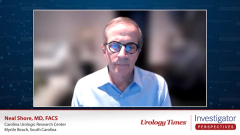
Emerging Agents in BCG-Unresponsive NMIBC
A urologist discusses treatments in the pipeline that can further improve the therapeutic landscape in BCG-unresponsive NMIBC.
Episodes in this series

This is a video synopsis/summary of an Investigator Perspectives featuring Neal Shore, MD, FACS.
Shore emphasizes the exciting developments in bladder cancer, including multiple new treatment approaches. Beyond the therapies already discussed, he highlights promising viral gene vectors like CG0070 to stimulate antitumor immunity when given intravesically.
For muscle invasive bladder cancer, efforts to spare the bladder are progressing with novel additions like intravesical devices or immunotherapy to enhance efficacy. The combination of enfortumab vedotin and pembrolizumab produced notable results for first-line metastatic disease in the phase 3 EV-302 trial, supporting study of this regimen in other settings like neoadjuvant therapy.
Finally, for non–muscle invasive disease, combining emerging strategies with BCG could synergize effects. Across settings from BCG-unresponsive high-risk non–muscle invasive bladder cancer to frontline metastatic disease, Dr Shore conveys excitement for the rapid evolution in bladder cancer research and care.
Video synopsis is AI generated and reviewed by Urology Times® editorial staff.
Newsletter
Stay current with the latest urology news and practice-changing insights — sign up now for the essential updates every urologist needs.







